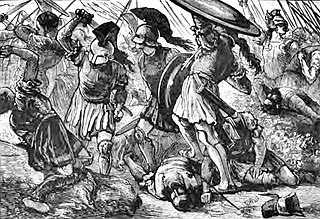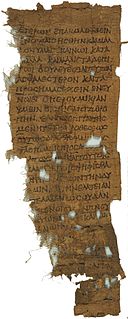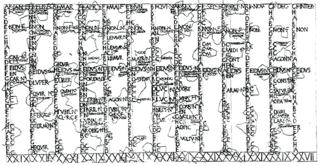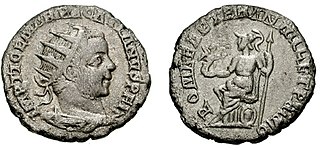Year 341 BC was a year of the pre-Julian Roman calendar. At the time it was known as the Year of the Consulship of Venno and Privernas. The denomination 341 BC for this year has been used since the early medieval period, when the Anno Domini calendar era became the prevalent method in Europe for naming years.
Year 347 BC was a year of the pre-Julian Roman calendar. At the time it was known as the Year of the Consulship of Venno and Torquatus. The denomination 347 BC for this year has been used since the early medieval period, when the Anno Domini calendar era became the prevalent method in Europe for naming years.

Demosthenes was a Greek statesman and orator of ancient Athens. His orations constitute a significant expression of contemporary Athenian intellectual prowess and provide an insight into the politics and culture of ancient Greece during the 4th century BC. Demosthenes learned rhetoric by studying the speeches of previous great orators. He delivered his first judicial speeches at the age of 20, in which he argued effectively to gain from his guardians what was left of his inheritance. For a time, Demosthenes made his living as a professional speech-writer (logographer) and a lawyer, writing speeches for use in private legal suits.
This article concerns the period 349 BC – 340 BC.
This article concerns the period 359 BC – 350 BC.
Eubulus was a statesman of ancient Athens, who was very influential in Athenian politics during the period 355 BC to 342 BC and was notable for his abilities in managing Athenian finances.

The Battle of Chaeronea was fought in 338 BC, near the city of Chaeronea in Boeotia, between the Macedonians led by Philip II of Macedon and an alliance of some of city-states led by Athens and Thebes. The battle was the culmination of Philip's campaign in Greece and resulted in a decisive victory for the Macedonians.

The so-called Battle of Crocus Field was a battle in the Third Sacred War, fought between the armies of Phocis, under Onomarchos, and the combined Thessalian and Macedonian army under Philip II of Macedon. In the bloodiest battle recorded in Ancient Greek history, the Phocians were decisively defeated by Philip's forces. Philip's victory secured his appointment as ruler of Thessaly, marking an important step in the rise of Macedon to political ascendancy in Ancient Greece. Opinion amongst historians is divided as to the year of the battle; some favour 353 BC, and others 352 BC.
Cersobleptes, also spelled Kersobleptes, Kersebleptes, and Cersebleptes, was son of Cotys, king of Thrace, on whose death in 358 BC he inherited the kingdom in conjunction with Berisades and Amadocus II, who were probably his brothers. He was very young at the time, and the whole management of his affairs was assumed by the Euboean adventurer, Charidemus, who was connected by marriage with the royal family. The area controlled by Cersobleptes was east of the river Hebrus.
The First Philippic was delivered by the Athenian statesman and orator Demosthenes between 351 BC-350 BC. It constitutes the first speech of the prominent politician against Philip II of Macedon.
The Second Philippic is an oration that was delivered by the Athenian statesman and orator Demosthenes between 344 BC-343 BC. The speech constitutes the second of the four philippics the orator is said to have delivered.
The Third Philippic was delivered by the prominent Athenian statesman and orator, Demosthenes, in 341 BC. It constitutes the third of the four philippics.
On the Chersonese is a political oration delivered by the Athenian statesman and orator Demosthenes in 341 BC. A short time later Demosthenes delivered one of his most famous speeches, the Third Philippic.

On the Crown is the most famous judicial oration of the prominent Athenian statesman and orator Demosthenes, delivered in 330 BC.
On the Peace is one of the most famous political orations of the prominent Athenian statesman and orator Demosthenes. It was delivered in 346 BC and constitutes a political intervention of Demosthenes in favor of the Peace of Philocrates.
On the False Embassy is the name of two famous judicial orations, both delivered in 343 BC by the prominent Athenian statesmen and fierce opponents, Demosthenes and Aeschines.

The Third Sacred War was fought between the forces of the Delphic Amphictyonic League, principally represented by Thebes, and latterly by Philip II of Macedon, and the Phocians. The war was caused by a large fine imposed in 357 BC on the Phocians by the Amphictyonic League, for the offense of cultivating sacred land; refusing to pay, the Phocians instead seized the Temple of Apollo in Delphi, and used the accumulated treasures to fund large mercenary armies. Thus, although the Phocians suffered several major defeats, they were able to continue the war for many years, until eventually all parties were nearing exhaustion. Philip II used the distraction of the other states to increase his power in northern Greece, in the process becoming ruler of Thessaly. In the end, Philip's growing power, and the exhaustion of the other states, allowed him to impose a peaceful settlement of the war, marking a major step in the rise of Macedon to pre-eminence in Ancient Greece.
Python of Byzantium was an ancient Greek statesman and former student of Isocrates. In 346 BC, he appears to have participated in negotiations at Pella that resulted in the Peace of Philocrates. In 343 BC, Python represented Philip II of Macedon in Athens with an offer to alter the overall treaty. Hegesippus remarked that Python oratorically adhered to the instructions of his teachers in Athens. Based on Demosthenes's Against Aristocrates, Python of Byzantium was identified with Python of Aenus the latter of which killed King Cotys I of the Odrysian Kingdom. However, it is highly unlikely that both names are attributed to one individual.

Under the reign of Philip II, the kingdom of Macedonia, initially at the periphery of classical Greek affairs, came to dominate Ancient Greece in the span of just 25 years, largely thanks to the personality and policies of its king. In addition to utilising effective diplomacy and marriage alliances to achieve his political aims, Philip II was also responsible for reforming the ancient Macedonian army into an effective fighting force. The Macedonian phalanx became the hallmark of the Macedonian army during his reign and the subsequent Hellenistic period. His army and engineers also made extensive use of siege engines.









